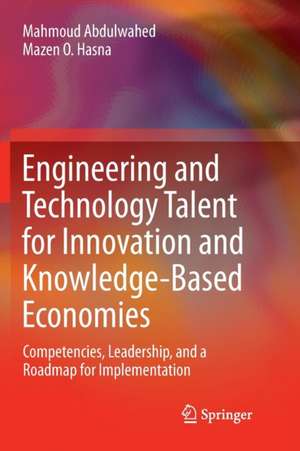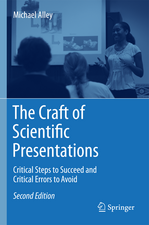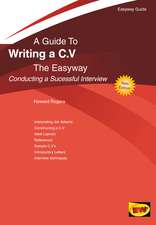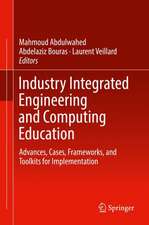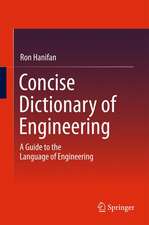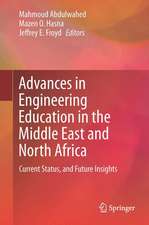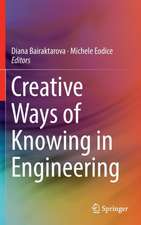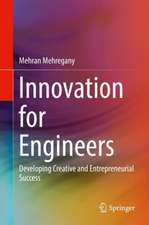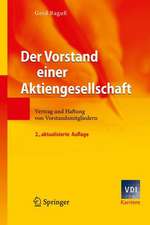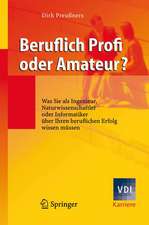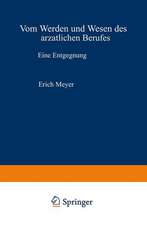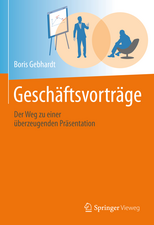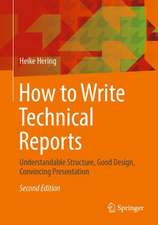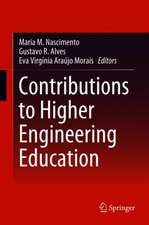Engineering and Technology Talent for Innovation and Knowledge-Based Economies: Competencies, Leadership, and a Roadmap for Implementation
Autor Mahmoud Abdulwahed, Mazen O. Hasnaen Limba Engleză Paperback – 7 iul 2018
| Toate formatele și edițiile | Preț | Express |
|---|---|---|
| Paperback (1) | 637.78 lei 43-57 zile | |
| Springer International Publishing – 7 iul 2018 | 637.78 lei 43-57 zile | |
| Hardback (1) | 643.99 lei 43-57 zile | |
| Springer International Publishing – 28 dec 2016 | 643.99 lei 43-57 zile |
Preț: 637.78 lei
Preț vechi: 750.33 lei
-15% Nou
Puncte Express: 957
Preț estimativ în valută:
122.04€ • 127.74$ • 101.58£
122.04€ • 127.74$ • 101.58£
Carte tipărită la comandă
Livrare economică 31 martie-14 aprilie
Preluare comenzi: 021 569.72.76
Specificații
ISBN-13: 9783319835211
ISBN-10: 3319835211
Ilustrații: XVIII, 225 p. 37 illus. in color.
Dimensiuni: 155 x 235 mm
Greutate: 0.35 kg
Ediția:Softcover reprint of the original 1st ed. 2017
Editura: Springer International Publishing
Colecția Springer
Locul publicării:Cham, Switzerland
ISBN-10: 3319835211
Ilustrații: XVIII, 225 p. 37 illus. in color.
Dimensiuni: 155 x 235 mm
Greutate: 0.35 kg
Ediția:Softcover reprint of the original 1st ed. 2017
Editura: Springer International Publishing
Colecția Springer
Locul publicării:Cham, Switzerland
Cuprins
Engineering and Technology for Innovation and Knowledge Based Economies (iKBEs), Book Objectives and Overview.- Literature Review of iKBE Competencies & Systemic Modelling.- Leadership: Models, Competencies, and the Emergence of Engineering Leadership.- On Industry – Academia Collaboration for iKBE.- On the Response for iKBE Development: Excellence in Technology’ Innovation & Entrepreneurship, and a Proposed Structure.- Methodology, Tools, and Systemic Framework for iKBE Competencies Investigation.- Empirical National Case Study: Current and Future Engineering Skills Needs, and Engineering Education System Necessities in Qatar.- Main Highlights AND Future Developments for iKBEs.
Notă biografică
Dr. Mahmoud Abdulwahed: Dr Mahmoud holds BSc, MSc, and PhD in electrical, control and systems engineering; he completed his postgraduate studies in Germany, Sweden, and the UK. His main expertise is in Innovation, Transfer, and Education; he is ranked among the top 25 globally in the field of Engineering Education research in last three years in terms of indexed publications in Scopus (2013-2016 period). Mahmoud joined Qatar University in fall 2011 as a faculty member; from spring 2013 till spring 2016 he worked as Adviser and then Manager of Strategic Initiatives & Innovations; his role focused on inception, coordination, and/or management of several strategic initiatives and innovation-based practices across campus and in selected colleges. He also worked with the College of Engineering on the inception of the “Technology Innovation & Engineering Education (TIEE) Department ” where he moved in Spring 2016 to work on its implementation. Mahmoud received several fellowships Australia, Malaysia, and USA. He published 60+ peer-reviewed conference and journal articles, 3 books/chapters, and attained a number of industry research funds, academic recognitions, awards, and best papers distinctions.
Dr. Mazen O. Hasna: Dr. Hasna received the B.S. degree from Qatar University, Doha, Qatar in 1994, the M.S. degree from the University of Southern California (USC), Los Angeles in 1998, and the Ph.D. degree from the University of Minnesota, Twin Cities in 2003, all in electrical engineering.
In 2003, Dr. Hasna joined the department of electrical engineering at Qatar University as an assistant professor. He served as the head of the electrical engineering department, the associate dean for academic affairs, and the dean of engineering between 2005-2012. Currently, he serves as the vice president and chief academic officer of Qatar University. Dr. Hasna is a founding member of the IEEE section in Qatar and the society of Qatari engineers. He is a member of the joint management committee of the Qatar Mobility Innovation Center (QMIC), and a board member of Qatar National Library (QNL).
Dr. Hasna’s research interests span the general area of digital communication theory and its application to performance evaluation of wireless communication systems over fading channels. Current specific research interests include cooperative communications, ad hoc networks, cognitive radio, optical communications and network coding. He was selected recently to the 2015 Thomson Reuters highly cited list for his research contributions in the area of wireless communications. Dr. Hasna is active also in the area of engineering education, and has published several papers in the field, and recently edited a book about advances in engineering education in the MENA region.
Dr. Mazen O. Hasna: Dr. Hasna received the B.S. degree from Qatar University, Doha, Qatar in 1994, the M.S. degree from the University of Southern California (USC), Los Angeles in 1998, and the Ph.D. degree from the University of Minnesota, Twin Cities in 2003, all in electrical engineering.
In 2003, Dr. Hasna joined the department of electrical engineering at Qatar University as an assistant professor. He served as the head of the electrical engineering department, the associate dean for academic affairs, and the dean of engineering between 2005-2012. Currently, he serves as the vice president and chief academic officer of Qatar University. Dr. Hasna is a founding member of the IEEE section in Qatar and the society of Qatari engineers. He is a member of the joint management committee of the Qatar Mobility Innovation Center (QMIC), and a board member of Qatar National Library (QNL).
Dr. Hasna’s research interests span the general area of digital communication theory and its application to performance evaluation of wireless communication systems over fading channels. Current specific research interests include cooperative communications, ad hoc networks, cognitive radio, optical communications and network coding. He was selected recently to the 2015 Thomson Reuters highly cited list for his research contributions in the area of wireless communications. Dr. Hasna is active also in the area of engineering education, and has published several papers in the field, and recently edited a book about advances in engineering education in the MENA region.
Textul de pe ultima copertă
This book introduces and analyzes the models for engineering leadership and competency skills, as well as frameworks for industry-academia collaboration and is appropriate for students, researchers, and professionals interested in continuous professional development. The authors look at the organizational structures of engineering education in knowledge-based economies and examine the role of innovation and how it is encouraged in schools. It also provides a methodological framework and toolkit for investigating the needs of engineering and technology skills in national contexts. A detailed empirical case study is included that examines the leadership competencies that are needed in knowledge-based economies and how one university encourages these in their program. The book concludes with conceptual modeling and proposals of specific organizational structures for implementation in engineering schools, in order to enable the development of necessary skills for future engineering graduates.
Caracteristici
Contains a comprehensive literature review of skills development and research in engineering education, as well as a comprehensive appendix of research methodologies Contains case studies of engineering programs from schools in Finland, Singapore, and Ireland, as well as a more detailed study of implementing an engineering program in Qatar Examines the biggest gaps in skills found in recent graduates, and outlines the future trends of skills demand and a roadmap to meet these demands Includes supplementary material: sn.pub/extras
